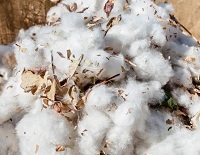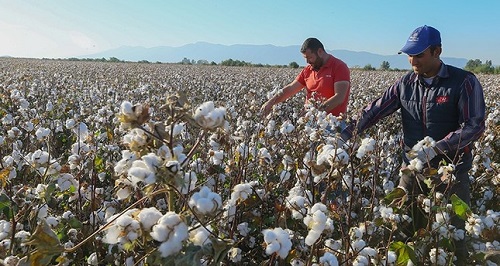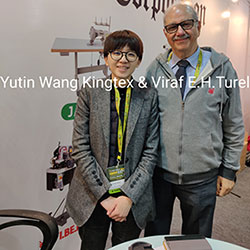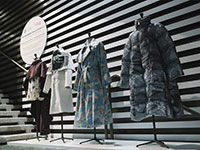FW
Denimsandjeans will be held in Japan from March 4 to 5, 2020. This is the first edition of the show in Japan. The list includes almost all major denim suppliers from Japan and other countries including Italy, China, Turkey, Indonesia, Pakistan, India and Bangladesh. Eleven denim companies from Japan including Kurabo, Kuroki, Collect-Japan Blue, Nihon Menpu, Showa and Sinhohara Textile will participate. Eight companies from China including Advance Denim, Foison, Lucky Textile and Foshan Huafeng will be participating.
China is also one of the biggest denim exporters to Japan. Garment vendors from Bangladesh including Noize Jeans will exhibit their new collection for spring-summer 2021. Pioneer Denim, one of the fastest growing fabric manufacturers from Bangladesh, is also going to bring its innovation and new sustainable developments at Japan show. Next to China, Bangladesh is the second biggest jeans exporter to Japan. Last year, Bangladesh's share in the total jeans imports of Japan was about 18 per cent, and it has been increasing every year. Big denim giants from Pakistan will present their collections.
Apart from fabrics and garments, the show will have chemical manufacturers, accessories suppliers, washing laundries, fiber producers and technology providers. A special indigo museum by Arvind and a small museum of 100 year old vintage garments by Elleti will be set up at the show.
In the first quarter Fast Retailing’s operating profit dropped. The owner of the Uniqlo chain was hurt by the Hong Kong protests in the quarter and also by a consumer boycott that affected sales and tipped it into losses in the important South Korean market from September to November. But on the upside, the US business improved while smaller and younger-focused GU brand saw operating profit rising 44 per cent.
New stores in Australia and India also boosted the group’s sales. Asia, and more specifically China, is hugely important to the growth of the Japanese company. And its Uniqlo brand has a major presence there with its product mix appealing both to consumers on a budget and more affluent shoppers looking both for well designed basics and its collaborations, such as the recent one with Marimekko.
Same store December sales for Uniqlo in Japan, including online, were down 5.3 per cent year-on-year, while total sales, again including online, decreased by 5.5 per cent. This was caused by persistently high temperatures from the middle of the month onwards that resulted in sluggish sales of cold weather clothing.
The year to August is now expected to see operating profit down five per cent.
Cologne in Germany will host the first International Conference on Cellulose Fibres conference on cellulose fibers, February 11 to 12, 2020. This will bring together the world’s most important producers and players. With 30 presentations, the program covers a wide range of topics such as markets and politics, sustainability and circularity, new production technologies, alternative raw materials and applications in the fields of textiles, hygiene products, biocomposites and food. The focus is also on applications in which plastics can be replaced by cellulose fibers. Leading companies will present their latest technological developments, new properties and applications. Life cycle assessments and concepts for the extraction of cellulose fibers from alternative raw material sources will also be presented, whereby the fibers can be reintegrated into the circular economy to be used again. The industry’s market leaders will be joined by various start-ups and leading research institutes.
Sustainability will be highlighted by two sessions and a panel discussion, in which users, certifiers and environmental groups will participate. An additional thematic focus is the biodegradability of cellulose fibers. This topic is of particular importance because microfibers inevitably enter the wastewater during the washing of textiles. Additionally, various disposable plastic products that can be partially substituted by cellulose fibers will be banned from 2021. There will be scientific presentations on these topics.
Jacket Required, the UK’s only contemporary menswear and street wear trade show taking place at the Old Truman Brewery, East London on the January 22nd to 23rd 2020, places sustainability at the center of its new direction dedicating a third of the show to sustainable brands. The re-edited layout will feature three showrooms with Showroom a brimming with pioneers in sustainable fashion including RÆBURN, Thalassophy, Bjanko Milano, Daisy King Club, Dedicated Brand, Komodo, United Change Makers (UCM), TOMS, Dashel, and Ucon Acrobatics.
Alongside an ‘exclusive to the UK’ installation RÆBURN will present its AW20 collections. AW20 sees RÆBURN collaborate with award-winning Icelandic photographer Ragnar Axelsson (“Rax”). For over 40 years Rax has been photographing the people, animals and landscape of the most remote regions of the Arctic, including Iceland, Siberia and Greenland. In hauntingly beautiful images, he captures the elemental, human experience of nature at the edge of the liveable world, making visible the extraordinary relationships between the people of the Arctic and their extreme environment — relationships now being altered in profound and complex ways by the unprecedented changes in climate.
RÆBURN has used original full colour images captured by Rax throughout the collection, printed onto 100% RÆCYCLED cotton-feel polyesters and silk habotai. CARCASS is a new, radical extension of the designer’s RÆMADE concept, adopting an approach normally associated with hunter-gatherers: every last scrap of the original garment is used in its entirety, adding nothing new but branded labels and thread.
Jacket Required also launches new label by its Sustainable Ambassador Phil Wildbore. United Change Makers offers a capsule collection; styles that last from season to season and become a timeless piece in your wardrobe.
Taking place in East London’s Old Truman Brewery on January 22nd and 23rd January, Jacket Required is a premium show offering buyers an inspiring, carefully edited international line-up of contemporary menswear, streetwear, breakthrough talent, footwear, accessories and lifestyle products.
"An important link between Europe and Asia, Turkey is a significant exporter of cotton and cotton products to the European Union. The country's textile exporters are known for their fast order response time and higher quality products. Nearly 36,000 companies operate in the sector. The EU remains the leading market for Turkish textiles and garment exporters due to its geographical proximity, short response time and good quality products."
 An important link between Europe and Asia, Turkey is a significant exporter of cotton and cotton products to the European Union. The country's textile exporters are known for their fast order response time and higher quality products. Nearly 36,000 companies operate in the sector. The EU remains the leading market for Turkish textiles and garment exporters due to its geographical proximity, short response time and good quality products.
An important link between Europe and Asia, Turkey is a significant exporter of cotton and cotton products to the European Union. The country's textile exporters are known for their fast order response time and higher quality products. Nearly 36,000 companies operate in the sector. The EU remains the leading market for Turkish textiles and garment exporters due to its geographical proximity, short response time and good quality products.
The three major cotton growing areas in Turkey include the Aegean, Çukurova and GAP regions. The country also produces small amounts of cotton around Antalya. The cotton grown in the Aegean region is recognised as one of the best in terms of quality and is also referred to by textile producers. Though this cotton has more staple length than the cotton grown in either Çukurova or the GAP (1 1/8") region, its quality has improved significantly due to improved seed quality.
Excessive rains, untimely fumigation affects cotton yield
Both the total area under cotton plantation and production for MY 2018–19 declined to 525,000 hectare and 806,000 metric tonne respectively in 2018. Yields were affected due to excessive rains, which necessitated replanting, cool weather during the season and untimely fumigation with stimulated pest attacks in cotton-growing regions.
due to excessive rains, which necessitated replanting, cool weather during the season and untimely fumigation with stimulated pest attacks in cotton-growing regions.
Heavy rains during the picking season affected yield in the Southeastern Anatolia (GAP) region. In addition, increase in prices of fertilisers and other chemical is likely to force farmers to reduce their usage of these inputs in the coming season. It may further affect the yields in the region.
In MY 2019-20, the total area under cotton plantation area and production in the country is expected to further reduce to 540,000 hectare and 893,000 metric tonne respectively. However, cotton growers in the GAP region had no alternative to planting cotton this season as the field conditions in the country are not suitable for planting any other crop.
Government policies to boost production
To boost cotton production, the Turkish government has introduced a number of policies including:
• GAP (Guneydoğu Anadolu Projesi/Southeastern Anatolian Project) Initiative: Through this initiative, the government has invested $25 billion over the past three decades in dam construction, irrigation channels and other infrastructure initiatives. It has also provided technical and financial assistance to farmers to build modern drip irrigation systems to prevent ecological problems and waste of water resources.
• The government has carried out studies on the shift from open canal irrigation systems to closed systems and is trying to implement and develop sustainable farming practices as a part of the Better Cotton Initiative.
• The Turkish government had promoted cotton production by giving a bonus for five years in a row until MY 2017-18 and retained it for MY 2018–19.
• Cotton import faces zero import tax in the country. Turkish importers do not need to pay the 3 percent import tax if they are exporting the materials produced from the imported cotton. But US cotton is subjected to a 3 per cent anti-dumping duty (since April 2016).
• Turkey has issued a new taxation directive on imported cotton yarn in order to support imports from countries such as Turkmenistan, India and Pakistan, which are the major cotton yarn suppliers to the nation.
• Turkish importers of cotton yarn do not require to pay tax if they export the product made with the same imported cotton yarn. Turkey is a major consumer of cotton and faces impediments in domestic cotton production. Hence, Turkey will continue to import cotton for years to come.
"The Fairyland for Fashion represents a unique location where visitors can make contact with the main international suppliers for fabrics (cotton, denim, silk, linen and hemp, wool, leather and related materials, synthetic fibres, suiting, embroidery and lace, jacquard, plain or printed fabrics, etc.), finished clothing products, trimmings, services and accessories"
 The Fairyland for Fashion. Six major trade fairs are grouped under this banner, thanks to Messe Frankfurt France are dedicated to fabrics and materials, to garment production, textile innovation, clothing and accessories.
The Fairyland for Fashion. Six major trade fairs are grouped under this banner, thanks to Messe Frankfurt France are dedicated to fabrics and materials, to garment production, textile innovation, clothing and accessories.
Four days offering a wealth of opportunities and discoveries from among a thousand exhibitors from thirty countries, who have their rightful place at the six shows organised in Paris - Le Bourget by Messe Frankfurt France.
The Fairyland for Fashion represents a unique location where visitors can make contact with the main international suppliers for fabrics (cotton, denim, silk, linen and hemp, wool, leather and related materials, synthetic fibres, suiting, embroidery and lace, jacquard, plain or printed fabrics, etc.), finished clothing products, trimmings, services and accessories.
An ideal place to meet up and work on future projects involving the selection of materials, issues relating to clothing production or innovations for the buyers from ready-to-wear labels, high fashion design houses or accessory brands.
Key events under The Fairyland for Fashion:
Avantex Paris is the most important international trade fair dedicated to innovative technologies and sustainable development for the benefit of the fashion industries. The February show will assemble twenty of the most innovative projects for fabrics, materials and components, which provide a unique and practical view of what tomorrow’s fashion holds in store. 
Apparel Sourcing Paris will open its doors for the eighteenth edition this February. As the prime trade fair in Europe for sourcing of clothing, this time around Apparel Sourcing Paris will be host to about 400 exhibitors, who come from some fifteen countries, signalling a slight increase. Large numbers of Indian businesses will be exhibiting, with attendance by some twenty exhibitors supported by the main trade organisations for promoting Indian textile products. Egypt will also be there, as well as Ethiopia, which is a loyal exhibitor. Vietnam has chosen the show to demonstrate its myriad skills when it comes to clothing production.
Leatherworld Paris, the trade fair for flexible materials, natural animal-based materials, artificial or synthetic materials, will assemble some thirty exhibitors in February, who specialise in this segment and who come from ten different countries. The offer at the show is more specifically targeted at sectors such as leather goods, footwear, gloves, and articles made of skin or fur.
Shawls&Scarves Paris is the only show showcasing key products from ranges offered by international manufacturers of scarves, wraps, shawls, headscarves, stoles, capes and ponchos. Some fifty exhibitors, specialist producers of accessories and textile items for the upper body will once again present an unrivalled offer in Paris, with an extremely broad variety of forms and materials (cashmere, wool, silk, cotton, linen, bamboo etc.).
Texworld Paris remains among the leaders for the sourcing of fabrics, components, materials and trimmings for the fashion and clothing sector. It is the must-attend event for international clothing manufacturers.
Texworld Denim Paris is recognised by international buyers for its very broad ranges of textiles and clothing manufacturers specifically for denim, concentrated in one location.
Banking on the growing demand for its machines, Turel Group expects 2020 to be a great year for the company.Viraf Turel, Chairman expounds on the company’s operations, future plans and the market in Ludhiana
 Unperturbed by the economic recession, the Turel Group of companies grew by 20 per cent in 2019. The company expects 2020 to also be a great year for it. “Our growth mainly comes from the jeans segment,” notes Viraf Turel, Chairman of the group. “Almost two of three Indians wear jeans as it offers them great comfort, convenience, and is also fashionable,” he adds.
Unperturbed by the economic recession, the Turel Group of companies grew by 20 per cent in 2019. The company expects 2020 to also be a great year for it. “Our growth mainly comes from the jeans segment,” notes Viraf Turel, Chairman of the group. “Almost two of three Indians wear jeans as it offers them great comfort, convenience, and is also fashionable,” he adds.
Automation for all
The company is a great proponent of automation as it believes that the customer is always looking for automation. “However, this automation should be carried out at an affordable price and it should be flexible in use,” he cautions further adding, “it should be useful to all customers and not restricted to any particular product.”
Multiple employment opportunities
Technology is not stealing jobs. There are multiple jobs available in the industry. “However, people don’t like to work as garment operators. They want a hygienic and comfortable factory environment that is also free from dust and noise pollution, has a five day work culture and is free of supervisors screaming at the operator. This is where automation helps,” adds Turel.
Turel is very optimistic about the Ludhiana market. Though imports from Bangladesh are a problem, the Ludhiana market is quite enthusiastic. “We are receiving quite a few inquiries for automatic machines and labor saving devices from this market,” adds Turel.
"International menswear show Pitti Uomo, held from January 7 to 10, 2020 in Florence's Fortezza da Basso, launched many new collections for F/W 2020-21. Though the show started on a slower note, its second and third days were busier and livelier, and hosted more number of visitors"
 International menswear show Pitti Uomo, held from January 7 to 10, 2020 in Florence's Fortezza da Basso, launched many new collections for F/W 2020-21. Though the show started on a slower note, its second and third days were busier and livelier, and hosted more number of visitors.
International menswear show Pitti Uomo, held from January 7 to 10, 2020 in Florence's Fortezza da Basso, launched many new collections for F/W 2020-21. Though the show started on a slower note, its second and third days were busier and livelier, and hosted more number of visitors.
Bright and energetic hues such as orange, red and bordeaux tones along with blue and military green hues dominated the show which also saw a return of the military and workwear fashion alongwith traditional woolen fabrics such as checked, houndstooth or tweed effect fabrics. Sheepskin gained popularity as an inner layer or as coats and jackets particularly for brands like Ten C and Closed x Nigel Cabourn, etc. Mixed with technical and different surfaces, metallic hues, technical played an important part in the collections of brands such as Mackage, RRD, Fila, Blauer. The most innovative items displayed were the newly developed eco-friendly and sustainable items.
Jackets made with eco-friendly materials
Jackets made of graphene were one of the most innovative developments at the event. These jackets are known to last longer as graphene is a good conductor of heat and made from Carbonium, a heat resistant material. Brands using this material include Woolrich, which has launched a jacket made of graphene fibers and padded with it.
Similarly, Italian brand Esemplare launched a zero signal jacket made with recycled nylon that is also padded with thermore thermal booster, a smart thermo-regulating padding. Newborn outer jacket brand Replumè launched jackets made with Pure, a padding made with recycled, sterilised-in-Italy and certified down. Swedish brand Houdini Sportswear launched a collection made with recycled, biodegradable and recyclable materials. Danish brand Knowledge Cotton Apparel presented a collection produced using 100 per cent sustainable methods and materials.
New manufacturing techniques on display
The show also launched Uyn, a unique 160-gram sneaker made by a special 3D knitting one-piece technique n 100 percent merino wool, and injected with a recyclable polyurethane sole.
Similarly, Lotto showcased new sneakers collection with H-Dry, a water-resistant breathable membrane, while Trussardi presented Beautiful Minds, a new course for the brand led by a series of new creative talents. United Standard launched a new collection inspired by workwear and reinterpreted its iconic greyhound logo.
The Closed x Nigel Cabourn capsule redesigned the items originally created by the Girbaud duo to add a new twist to its unisex, men's and women's collections.
Eco-friendly denims on display
Denim brand Hand Picked launched eco-friendly products. Hand Picked launched a denim collection made from bio-cotton and recycled cotton along with stretch fibers obtained from recycled PET. Another denim brand Peppino Peppino launched a collection of rinsed denims with back labels in Viridis, a sustainable corn-derived material. In addition, the brand launched a ozone treated collection that is made without using permanganate or chemicals.
Events at the show
The show also hosted many events such as celebration of the 20 years of Blauer and FGF’s launch in the European market. The brand, led by entrepreneur and designer Enzo Fusco, presented Human Landscapes, a multimedia installation curated by art director Felice Limosani.
Woolrich celebrated its 190th’s anniversary by presenting ‘The Ultimate Woolrich Experience’, an installation that showcased the evolution of the brand after its recent acquisition by L-Gam investment fund. Other events included the Rolf Ekroth & Terinit presentation which mixed a snowboarding culture with cyber punk, science fiction and military. The event, directed by Rolf Ekroth was presented by Swedish brand Terinit. Sergio Tacchini's event "Impossible Angle" also mixed the brand's tennis roots with the hip-hop theme from the '80s and '90s. The show ended with the K-Way fashion show which focused on reinventing its iconic windbreaker that is currently experiencing newfound success.
Emphasizing on sustainability, COTTON USA showcased WHAT’S NEW IN COTTON™ to the global home textile industry at its booth at Heimtextil in Frankfurt, Germany, from January 7th to 10th 2029.
“U.S. cotton’s sustainability provides COTTON USA with a unique selling point, particularly with the development of the U.S. Cotton Trust Protocol,” CCI Executive Director Bruce Atherley said. “U.S. cotton is a raw material that is leading the way in terms of sustainable practices – something that global brands now demand from their suppliers. The U.S. Cotton Trust Protocol is committed to raising the bar for responsible, sustainable farming methods.”
The new U.S. Cotton Trust Protocol is a tangible and transparent snapshot of U.S. cotton growing practices and the gains in sustainability standards resulting from them.
COTTON USA also invited attendees to visit the booth to learn about its collaboration and sourcing opportunities with leading brands and retailers around the world, as well as how to license the COTTON USA Mark, which quantitative consumer research proves is of high value to consumers and can drive both preference and higher prices.
At Heimtextil, one Chinese mill, which annually consumes 1,000 tons of U.S. cotton, joined the COTTON USA licensing program. Nine additional companies from Europe and Asia expressed interest in becoming COTTON USA licensees.
Ed Filipowski co-chairman of New York-based public relations agency KCD, has died at his home in New York after complications following a recent surgery.
“I will always remember the kindness Ed showed to me in the very early days of BoF, giving constructive feedback and advice, encouraging me to stay true to my voice and providing valuable access and opportunities to create meaningful stories,” said BoF’s founder Imran Amed. “All of us at BoF will remember him fondly and offer our deepest condolences to his loved ones and the KCD team. His spirit and keen eye for talent will live on in their dedication to our industry.”
An amazing orator of powerhouse fashion PRs, Filipowski supported the industry’s transformation from a loose network of independently run brands into a global business driven by multinational conglomerates. Throughout his career, he worked to help shape the careers of John Galliano, Donatella Versace, Tom Ford and others.
Born outside of Pittsburgh, Filipowski earned a journalism degree from Northwestern University and moved to New York in the early 1980s. He met the publicist Kezia Keeble just a few years later, eager to work at her hip PR agency, which repped brands like Stephen Sprouse and the of-the-era retailer Charivari. “It all goes to back to Kezia,” Filipowski told BoF in 2016.












